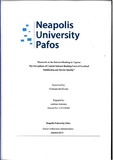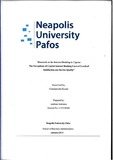| dc.contributor.advisor | Kostas, Giannopoulos | |
| dc.contributor.author | Antoniou, Andreas | |
| dc.date.accessioned | 2016-04-02T11:16:25Z | |
| dc.date.available | 2016-04-02T11:16:25Z | |
| dc.date.issued | 2013-01 | |
| dc.identifier.uri | http://hdl.handle.net/11728/7378 | |
| dc.description.abstract | E-commerce is the buying and selling of a product or service over electronic systems such as the Internet and other computer network. The Internet is a global system of interconnected computer networks that use the standard Internet protocol to serve billions of users worldwide. The Internet is defined as the worldwide interconnection of individual networks operated by government, industry, academia, and private parties. Initially the Internet served
in order to interconnect laboratories and workshops involved in government research and examination, and since 1994 it has been expanded to serve millions of users and a multitude of purposes in all parts of the world. The appearance of the Electronic and Internet commerce nowadays has now begun to create a different and innovative relationship between the customer and the service provider. In the environment of the internet banking, the displayed
of the use of the internet by bank associations as a network of selling their services and facilities was not only a sanctification but also a challenging and exciting issue. The whole and complete nonappearance of human interaction and collaboration, the low levels of customer satisfaction and the high levels of customer turnover have increased the need of better understanding customer's requirements and providing services of the higher quality. The present project aims to investigate customer satisfaction and the customer's perceived service quality in the area of internet banking. The following research took place in Cyprus, a place where the internet banking usage and internet perception is well below at present. In order to identify the relation between internet service quality and customers a specific model was adopted. The model consists of five major dimensions of web-based service quality selected through a detailed review of the literature. These dimensions are reliability, responsiveness, security, accessibility and quality of information. Each of the above dimensions was then examined through a survey of 120 valid questionnaires in terms of their relationship with and importance in satisfaction or dissatisfaction levels from the perspective of Cypriot electronic banking users. The results of the survey showed that while Cypriot electronic banking users are satisfied with the dimensions of security, reliability and quality of information, they are not so satisfied with the dimensions of accessibility and responsiveness. | en_UK |
| dc.language.iso | en | en_UK |
| dc.publisher | Business Administration Program, School of Economics Sciences and Business, Neapolis University Paphos | en_UK |
| dc.rights | Απαγορεύεται η δημοσίευση ή αναπαραγωγή, ηλεκτρονική ή άλλη χωρίς τη γραπτή συγκατάθεση του δημιουργού και κάτοχου των πνευματικών δικαιωμάτων | en_UK |
| dc.rights.uri | http://creativecommons.org/licenses/by-nc-nd/4.0/ | en_UK |
| dc.subject | Internet Banking | en_UK |
| dc.subject | Service Quality | en_UK |
| dc.subject | Electronic Commerce & Market | en_UK |
| dc.subject | Cyprus | en_UK |
| dc.title | Research on the Internet Banking in Cyprus: The Perceptions of Cypriot Internet Banking Users of Levels of Satisfaction and Service Quality | en_UK |
| dc.type | Thesis | en_UK |



